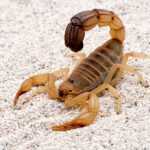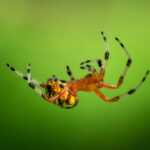Scorpions have the ability to climb walls, and you can use these expert tips to keep them out of your home.
Do scorpions have the ability to climb walls? Absolutely—especially when the surface has some texture! These nocturnal creatures move into your house by climbing its walls in search of prey and hiding spots. In this comprehensive guide, we explore the methods scorpions use to climb walls, the specific surfaces they prefer, and share essential information on how to protect your home from these eight-legged invaders.
- The Arizona bark scorpion, a tiny acrobat, can scale textured walls like a pro, always on the hunt for its next meal or hiding spot.
- These skilled climbers can be kept at bay by sealing tiny cracks, setting up smooth barriers they can’t grip, and decluttering dark areas where they love to hide.
- Keep yourself safe from scorpions and their pesky friends with sticky traps, natural repellents, and professional pest control services when necessary.
Can Scorpions Climb Walls?
Scorpions are surprisingly good climbers, though their ability varies by species. The Arizona bark scorpion is like the parkour champion of the arachnid world. With legs built for gripping and pincers that act like grappling hooks, they can climb rough surfaces such as stucco, brick, or wood—even upside down! While bark scorpions are the most notable climbers, other species can also climb walls depending on the surface texture.
These nocturnal creatures use their keen senses to hunt tasty insects like crickets, cockroaches, spiders, and other bugs. To prevent a scorpion problem, you need to understand their climbing abilities and habits.
How Scorpions Climb
Scorpions use tiny, hook-like structures on their feet called unguiculae that allow them to grip onto rough and textured surfaces. Their pincers also help stabilize and anchor them as they climb. However, these adaptations don’t work well on smooth surfaces such as glass or polished metal, which lack the texture needed for grip.
Scorpions’ Nocturnal Behavior and Climbing Activity
Being nocturnal creatures, scorpions are most active at night. This is when they venture out to hunt and explore, increasing the chances of climbing walls and entering homes. Understanding their nighttime activity can help you time inspections and control measures effectively.
Types of Surfaces Scorpions Can Climb
Not all walls are equal in the eyes of a scorpion. Their ability to climb depends largely on the texture and grip the surface provides.
Textured Walls
Scorpions are expert climbers on brick, stucco, or rough wood surfaces. Their pincers and legs latch onto every nook and cranny, letting them scale walls effortlessly in search of food or shelter. These textured walls are their playground for survival and stealth.
Smooth Surfaces
However, scorpions struggle to climb smooth surfaces such as glass, metal, or plastic. These materials offer no traction for their pincers and legs, causing them to fall—a phenomenon sometimes called a scorpion fall! Homeowners can use this to their advantage by placing glass jars or other smooth barriers under bed frames or entry points to keep scorpions grounded.
Can Scorpions Climb Glass?
Because glass is a very smooth surface, scorpions typically cannot climb it. This makes glass an effective barrier when placed strategically around entry points or under furniture legs to prevent scorpions from climbing.
Why Do Scorpions Climb Walls?
Scorpions climb walls mainly for two reasons: to hunt and to hide. They seek insects like crickets, roaches, spiders, and other bugs that often find refuge near or inside homes. They also look for dark, cool, and undisturbed hiding spots—such as basements, garages, or under furniture—to avoid predators and humans.
Scorpions’ Ability to Climb Trees and Rocks
In the wild, scorpions can climb natural vertical surfaces like trees and rocks. These surfaces provide them with shelter and hunting grounds. This ability means that homes surrounded by trees or rock piles may have a higher risk of scorpion entry as they use these natural climbing routes to approach houses.
Preventing Scorpions from Climbing Walls
Scorpions can squeeze through tiny gaps as narrow as the width of a credit card (about one-sixteenth of an inch). Seal those sneaky cracks around windows, doors, and foundations to block their secret entrances.
Install Smooth Barriers
Wrap your home’s entry points with smooth surfaces like glass, metal, or plastic. These materials have no ridges or grooves for scorpions to grip, effectively preventing their climb.
Reduce Outdoor and Indoor Clutter
Declutter your yard and home! Remove debris, firewood piles, standing water, and other cozy hiding spots. Less clutter means fewer hiding spots for scorpions and their insect prey.
Manage Other Pests
Since scorpions feed on insects such as crickets, cockroaches, spiders, and even rodents, controlling these pests reduces the food source that attracts scorpions. Effective pest control helps in taking care of the overall scorpion problem.
Seasonal Behavior and Scorpion Activity
Scorpion activity typically increases during warmer months when they are more active in hunting and reproduction. Being extra vigilant during these seasons can help reduce the risk of scorpion encounters.
Scorpions have a unique ability to fluoresce under ultraviolet (UV) light, glowing a bright blue-green color. Using a blacklight at night can help you spot scorpions hiding around your home, making removal easier.
Scorpion control is more effective when neighbors also maintain clean yards and homes. Community-wide efforts to reduce clutter, seal homes, and control insect populations can lower the overall scorpion presence in an area.
Effective Scorpion Control Products
Ready to fight back? Here are top tools for scorpion prevention and control:
Sticky Traps
Non-toxic and highly effective, sticky traps like Trapper Max Glue Boards catch scorpions and other pests as they roam. Position these traps along walls, baseboards, and entry points to intercept scorpions climbing inside.
Natural Repellents
Natural powders such as diatomaceous earth and boric acid, combined with essential oils like lavender and peppermint, create a scorpion-repelling system. These natural repellents deter scorpions without toxic chemicals.
Professional Pest Control Services
If scorpion infestations persist, professional pest control services are the most effective solution. Experts provide comprehensive scorpion control, including sealing entry points, safe treatment applications, and ongoing monitoring to keep your home free of scorpions and their prey like roaches, crickets, spiders, bed bugs, and rodents.
Bark scorpions and some other species demonstrate impressive climbing skills on textured walls as they hunt and seek shelter. However, they struggle to climb smooth surfaces like glass, metal, and plastic surfaces due to lack of traction. Preventing scorpion infestations involves sealing small cracks, installing smooth barriers, decluttering your space, managing other pests, and using sticky traps and natural repellents. For persistent scorpion problems, professional pest control services offer the best way to kill scorpions, rid your home of these pests, and prevent future infestations.
Frequently Asked Questions
Do all scorpion species have the ability to climb walls?
No. The Arizona bark scorpion and a few other species are excellent climbers, but most scorpions prefer textured surfaces.
What surfaces are hardest for scorpions to climb?
Smooth materials such as glass, metal, and plastic surfaces provide no grip and are difficult for scorpions to climb.
What steps should I take to stop scorpions from getting into my bed?
Keep bedding away from walls and floors, use smooth barriers under bed legs, keep bedding above floor level, and place sticky traps nearby. For more tips on preventing pests in your bed, see this guide.
Are natural repellents effective against scorpions?
Yes. Natural powders and essential oils serve as safe and effective scorpion deterrents.
When should I hire a professional pest control service?
If you have a persistent scorpion infestation or want comprehensive prevention, professional pest control services provide effective solutions.




